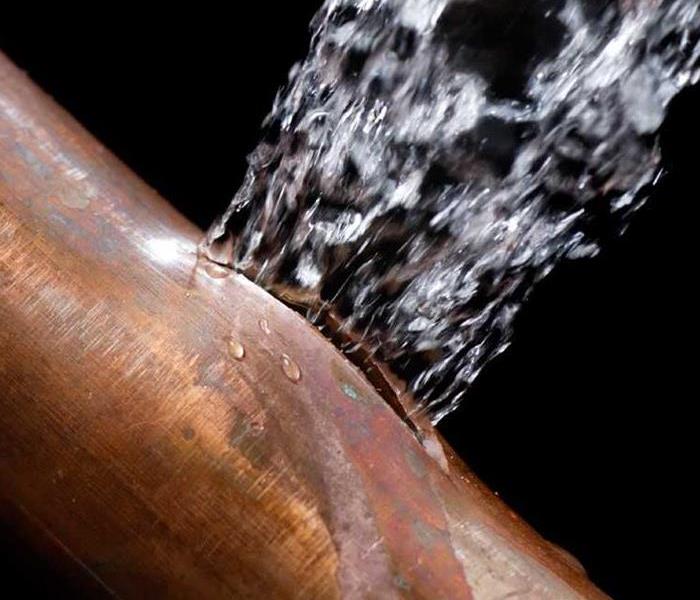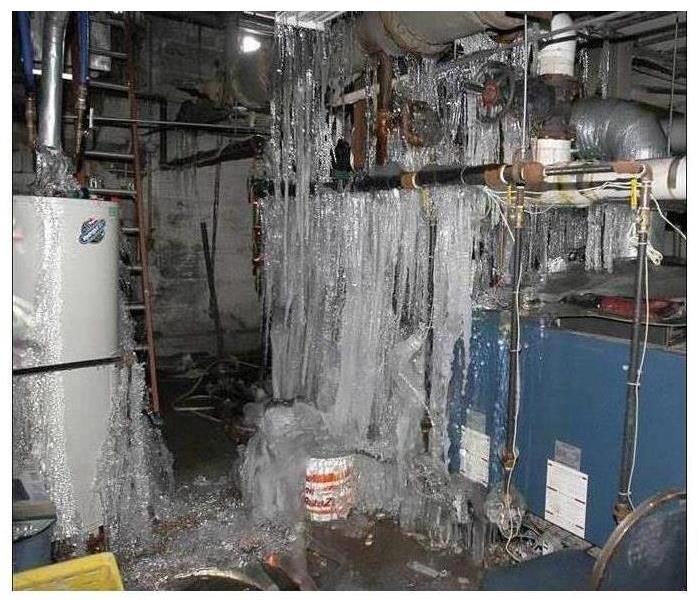Recent Water Damage Posts
How to prevent Sewage Backups
3/18/2021 (Permalink)
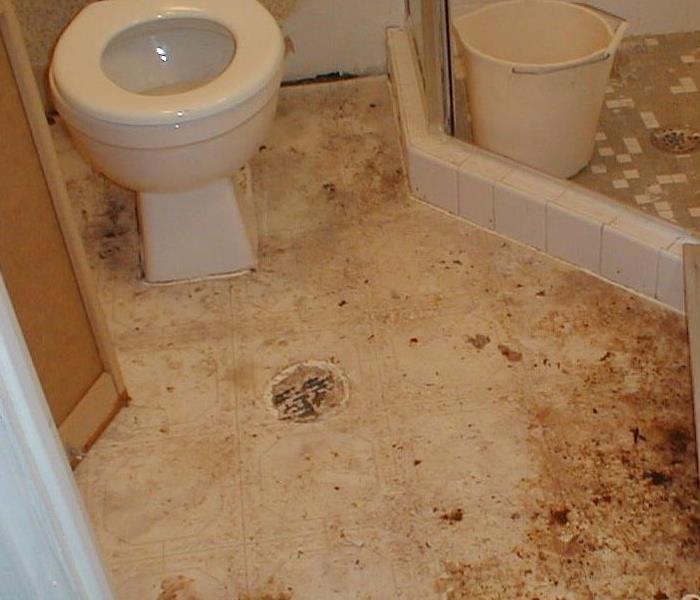 We can help clean up any mess.
We can help clean up any mess.
What Causes Sewage Backups in Homes and How to Handle Them
When sewer lines become obstructed, whereby preventing wastewater from flowing through drainage pipes, blockage occurs. The thick, black water that forms as sewage is a potential hazard, as it contains contaminants and viruses that can present a risk of severe illness if exposed to humans or animals. If you have a sewage backup in your basement, you will need to fix it quickly. Knowing what causes sewer backups, however, can help you prevent a hazardous situation in your basement or home. Here’s how to prevent and handle sewage backups in your pipes:
Sewage Backup Causes
- Clogs – Sewage can back up into your home when either your home’s drain pipes or main sewer line becomes clogged. For example, if one toilet creates a sewage backup, the drain connected to that toilet will likely be clogged. But if all toilets or bathtubs in your home create backflows, then there may be a clog in the main sewer line or the sump pump failed. Clogs can consist of hair, grease, or other solid materials that end up in the drains.
- Tree Roots – Trees can grow really long roots that intertwine with your sewer line. Roots can grow into a pipe and cause holes or crush the sewer line by growing around it. Even if the roots in your yard are not the problem, roots from nearby trees can reach your sewer line and damage it.
- Damaged Sewer Lines – In the past, pipes were made of cast iron and clay piping which don’t last very long. Aging sewage systems can break down and crack, causing sewage backups and flooded basements. Plastic sewer lines have now become the norm.
- Heavy Rainfall – Can heavy rain cause sewer backup? Yes, large amounts of rain can overburden your city’s sewer lines. If the public sewer can’t handle excess rainfall, the water can make its way into connected sewer lines. This puts your home at risk of water backflows.
SERVPRO of Decatur/Forsyth can help with any backup cleanups. Give us a call (217) 428-2371
Technology is key in getting the job done right!
2/23/2021 (Permalink)
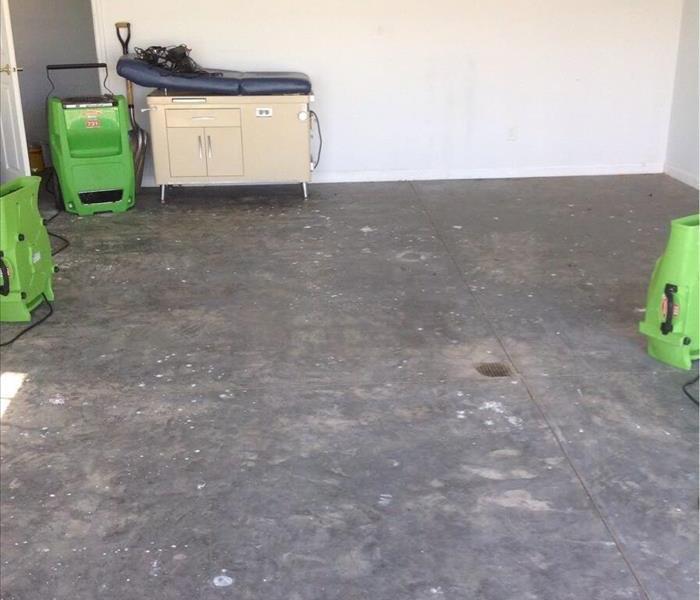 SERVPRO makes it "Like it never even happened."
SERVPRO makes it "Like it never even happened."
SERVPRO of Decatur/Forsyth uses advanced technology and techniques to provide the most efficient cleanup and restoration services to all of our residential and commercial business customers.
Specialized Water Detection, Extraction, and Drying Equipment
We use specialized equipment and apply scientific drying principles to help us detect moisture and measure moisture levels in areas hidden from sight by using infrared cameras to detect hidden moisture, and we use hygrometers to measure moisture in the air and other meters to measure the extent of moisture saturation.
Powerful water extraction equipment is used to rapidly extract water to speed up the drying process and high-speed air movers help water to evaporate more quickly while industrial grade dehumidifiers work to pull the water vapor from the air.
Specialized Techniques
We are trained in the science of odor removal and offer a range of odor removal products to neutralize any offensive odors, and use hospital-grade sanitizing agents, germicides, and anti-microbial treatments when needed.
Facts:
Within Minutes
- Water quickly spreads throughout your property, saturating everything in its path.
- Water is absorbed into walls, floors, upholstery, and belongings.
- Furniture finishes may bleed, causing permanent staining on carpets.
- Photographs, books, and other paper goods start to swell and warp.
Call Us Today! (217) 428-2371
Don't let the cold weather ruin your house!
2/19/2021 (Permalink)
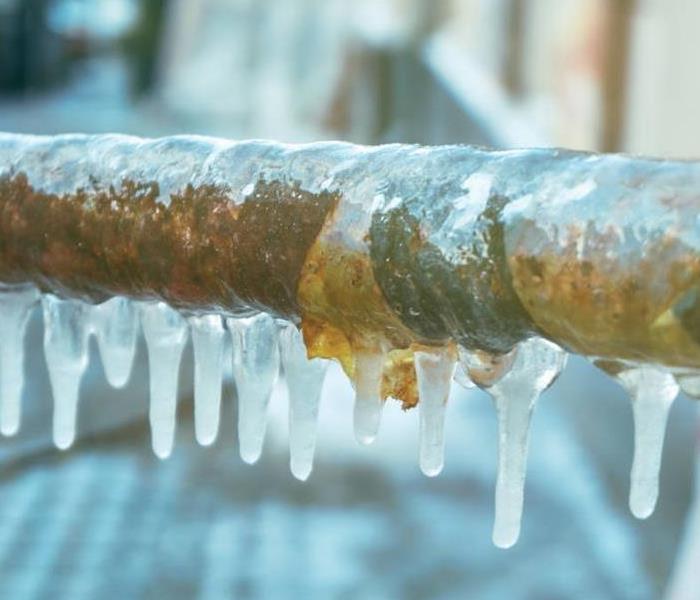 Prepare for cold weather!
Prepare for cold weather!
What causes pipes to freeze and burst?
Frozen pipes can be a damaging and expensive issue. Extremely cold temperatures of the winter months create a substantial risk for burst or frozen pipes. Being prepared and informed may help minimize the risk of frozen pipes and prevent extensive damage and repairs. How exactly can you prevent pipes from freezing and subsequently bursting? The American Red Cross provides several preventative measures to help reduce the chances of freezing pipes:
- Drain water from swimming pools and sprinkler supply lines.
- Remove, drain, and store outdoor hoses of any kind.
- Insulate exposed water pipes
- Open cabinet doors to allow for warmer air to circulate around the pipes in your home and garage.
- Let cold water drip from the faucet that is served by the exposed pipes to make sure they’re empty.
Doing these actions can greatly reduce the chance of pipes freezing. Though not bulletproof, these steps can certainly help! Make them a part of your winterizing activities before cold weather hits.
What to do if you suspect you have frozen pipe
If you neglected to protect your pipes, or perhaps the weather was more biting than you anticipated, you may still get a frozen pipe, unfortunately, despite your best efforts. Once again, the American Red Cross has suggested steps if frozen pipes are suspected in your home or garage:
- Keep the affected faucet open. As the pipes begin to thaw, the running water will help melt the ice.
- Apply heat to the frozen area of the pipe using a hairdryer, heating pad, etc. until the full water pressure is restored.
Following these steps will help thaw the suspected water quickly without causing a mess or worse, damage that requires a water cleanup!
When the pipes break in you home or business SERVPRO is ready to help.
1/28/2021 (Permalink)
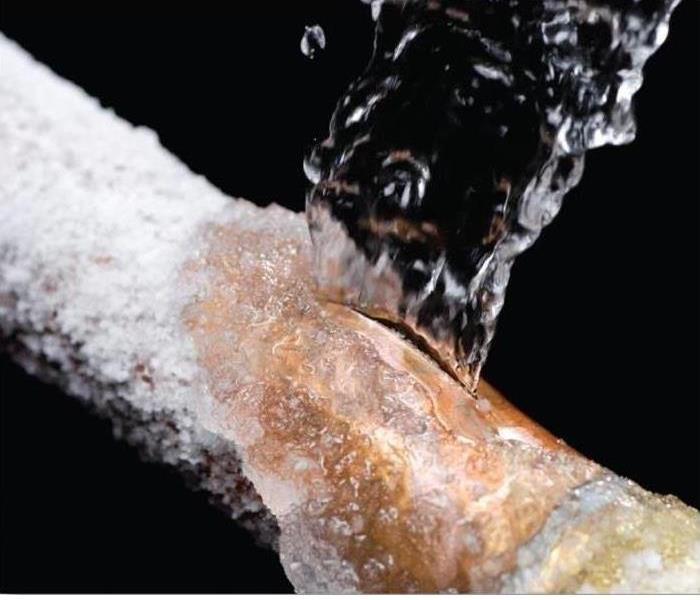 SERVPRO can help!
SERVPRO can help!
Home and business owners can do all of the right things and still end up with burst pipes. In subzero weather, even interior pipes can burst. Weakened seams or bends may succumb to pressure from any type of clog. When you have flood or water damage, call SERVPRO of Decatur/Forsyth immediately. Since we can't be there before you hang up the phone, there are some things you can do.
When the Pipes Break:
- Before there is an emergency, know where the water main is located
- The water main is usually under the kitchen sink or outside the building
- When the water starts gushing out of a burst pipe, turn off the water
- There will still be water in the pipes, so you need to drain that water:
- flush each toilet at least once
- run cold water from all taps
- turn off taps once the cold water is drained
- shut off the hot-water heater
- run the taps for the hot water
- turn off the taps once the hot water is drained
- Call a plumber
- Start cleaning up the water to prevent water damage
SERVPRO of Decatur/Forsyth is ready to help 24 hours a day 7 days a week. (217) 428-2371
Water can do damage at anytime. BE PREPARED!
11/2/2020 (Permalink)
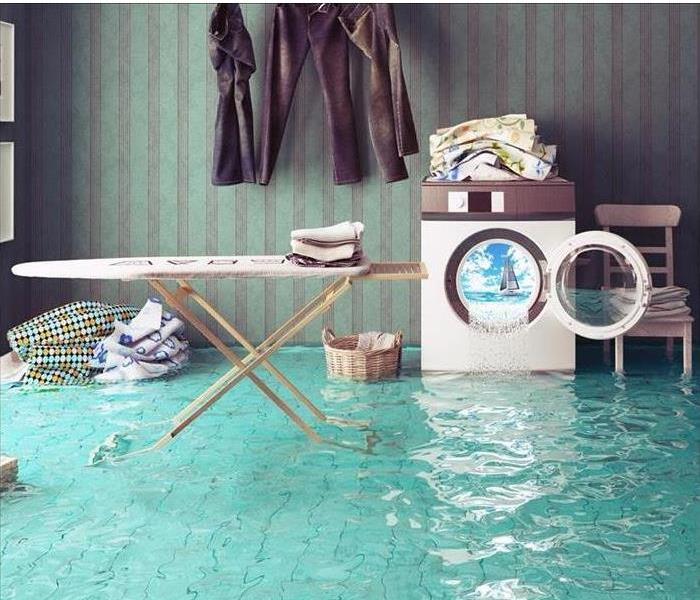 We are here to help with any size disaster.
We are here to help with any size disaster.
Water damage can happen at any point for anyone, home or business, resulting in damaged property. These do's are only for clean water and do not’s pertain to sewage water. Sewage water is treated differently since it causes different damage and requires a different cleanup process. With the right tools and pieces of equipment, our professionals can safely dry out your home or business and the contents within it. Here are some things to always keep in mind.
- To minimize the damage, make sure to shut off the source of water and turn off the electricity. It is essential to remove as much excess water as possible by mopping and soaking up with towels. This is especially important for wood furniture.
- To ensure that more damage isn't sustained by the furniture make sure to try and move it, if safe to do so.
- Make sure to NOT enter a room with standing water since there could be a risk of electrical shock
- Make sure to disconnect all power first.
- It is recommended to NOT leave rugs and furniture upholstery wet against one another because the fabrics have the potential to bleed between each other.
- It is important to note that you should not be utilizing your household vacuum to try and suck up any water.
If these tips are followed, then damage can be minimized and you will be better prepared for help to arrive. Remember to stay safe and get excess water cleaned up professionally to minimize the chance of mold growth. Our Team is Ready to help.
Water damages can happen in any season!
2/17/2020 (Permalink)
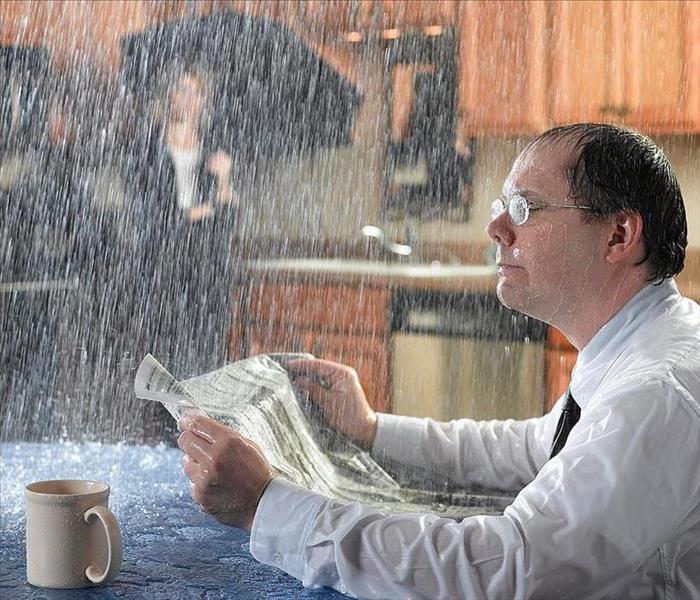 Don't let this be you!
Don't let this be you!
Many people think they don't have to worry about broken pipes in the spring/summer but that really isn't the case. Before leaving for that vacation you might want to turn off your water and drain the pipes just like you would in the winter.
There are many reasons for a broken pipe in the spring/summer. Here are a few:
1. Invasive tree roots.
2. Extended wet/dry spells ( this can make the ground shift and the extra pressure of this movement can cause problems with buried pipes).
3. Rust in Metal Pipes.
4. Wear and old age.
5. Hard Water.
6. Clogs.
7. Substandard repairs.
8. When a pipe burst; if you can, turn off the water supply at the main cut off valve when a pipe breaks.
9. Drain the water by running cold water in the sink and flushing the toilets.
10. Of course call:
SERVPRO of Decatur/Forsyth to help get your property dried out.
We are a 24/7 emergency service provider.
(217) 428-2371
Snow melt can create water issues in your basement.
2/7/2020 (Permalink)
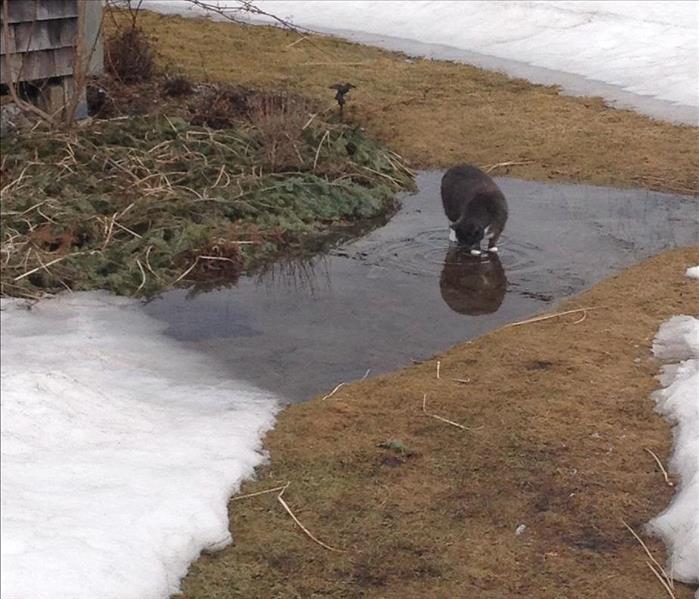 Be prepared when it warms up after a snow storm.
Be prepared when it warms up after a snow storm.
Wet Basement After a Snow Melt?
After a heavy snow comes water. This is just one of the many certainties we all face. Proper runoff and drainage can help direct water away from your foundation, but water can still sneak by. A sump pump can help push water away from your home. If your drainage or sump pump aren’t in proper working order, then melting snow could turn from flake to pond in your basement.
A wet basement is more than just a headache. Depending on how much water invades the space, it could signal serious damage to the structure of your home. In fact, just an inch of water creeping across the floor can cost you more than $10,000.
Here are a few tips you can employ to make sure your home stays dry during snow melt or spring rains.
1) Check the Gutters and Foundation Drainage.
2) Call a waterproofer!
3) Invest in a Sump Pump with an Alarm.
If your home has a water damage call SERVPRO of Decatur/Forsyth to make it "Like it never even happened."
The best way to keep mold from spreading is to act fast when you know water is present.
1/22/2020 (Permalink)
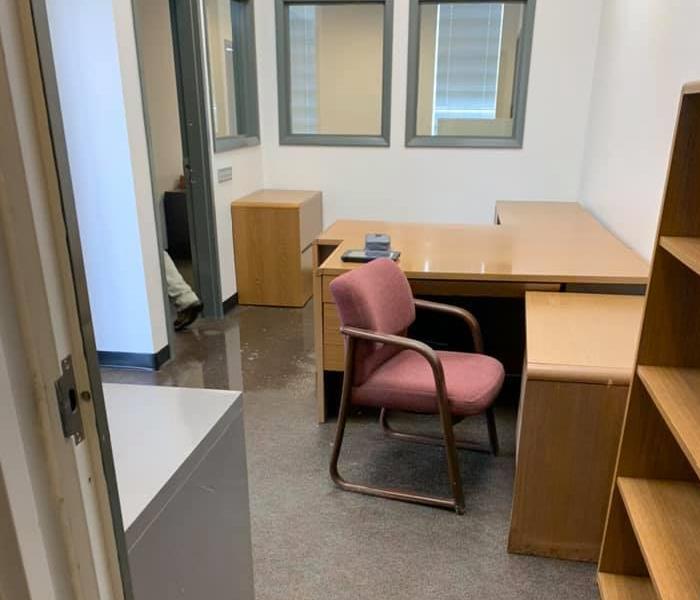 This is a local business that we were happy to help make it "Like it never even happened."
This is a local business that we were happy to help make it "Like it never even happened."
Keep mold from growing by acting fast with these steps!
1. Remove water as quickly as possible
Use a wet/dry vacuum to clean up as much water as soon as possible. These machines are the most effective tools for removing water and can be rented or provided by water and smoke damage remediation companies that specialize in repairing residential flood damage.
2. Use fans to speed up carpet drying process
It can take several days for fans to completely dry a water-damaged area. The good news is that they also help circulate fresh air.
3. Use a dehumidfier to dry out the room
These machines remove excessive moisture, which makes the air feel cooler and limits mold and mildew growth. Any equipment that helps dry out the air and the ground will speed up the drying time for your damaged floors and coverings.
4. Steam clean carpet and flooring
Steam clean all carpets to properly sanitize and deodorize. Typically, water-damaged carpet padding must be replaced.
Replacing just the padding is much less expensive than having to re-carpet your entire home.
5. Sanitize walls and baseboards
Anything touched by storm water should be sanitized. Clean all walls, hard-surface floors and other household surfaces with soap and water.
Sanitize them with a solution of 1.5 cups of chlorine bleach to one gallon of water. Remember to wear rubber gloves during cleanup.
6. Check furniture
Look for water damage and remove furniture from wet flooring.
Water damage can easily be hidden underneath rugs or carpet, so be sure to give your home a thorough inspection if you suspect water damage.
Call SERVPRO of Decatur/Forsyth to help you with any size disaster!
(217)428-2371
How To Prevent Cold-Weather Plumbing Problems
1/2/2020 (Permalink)
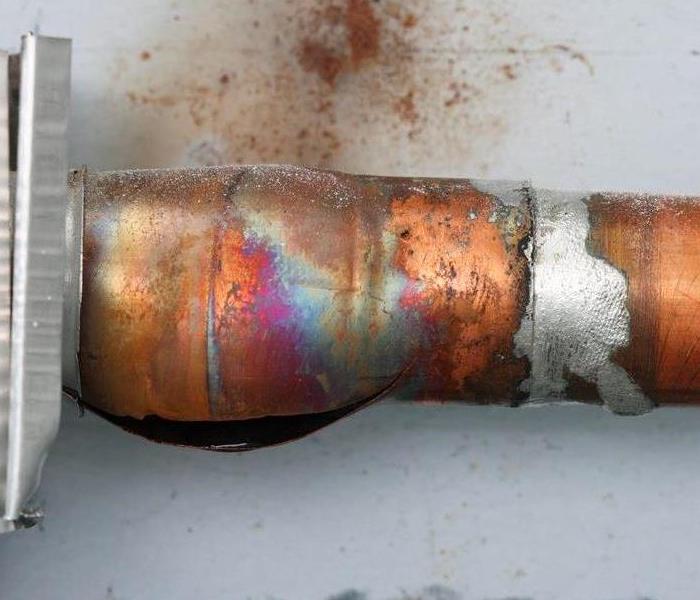 Prevent this from happening to you!
Prevent this from happening to you!
Use the following precautionary measures to prevent plumbing problems:
Lower the temperature of the water heater. When the water heater is first installed, plumbers turn its temperature to around 170 degrees Fahrenheit just in case. Yet, many homes don’t need that much steam and pressure.
This winter, turn down the water heater between 120 to 140 degrees Fahrenheit. This prevents a burst or leak and reduces heating costs between 6 to 10 percent. Tip: To be more eco-friendly, contact an expert during the warmer months about installing a tankless water heater or going solar.
Insulate pipes. After doing this, you pay less for hot water, and it’s less likely that the pipes will freeze. During the insulation process, look in the basement, crawl spaces, attic, garage, and under kitchen and bathroom counters. These spaces may have unheated water supply lines. Both hot and cold lines in these areas need insulation to maintain higher temperatures.
- Drain water from the swimming pool. If you have a swimming pool, drain the water and the sprinkler supply lines by following the manufacturer’s instructions.
- Open and disconnect the outdoor hose bibs and allow the water to drain completely. Once completed, close the indoor valves and keep the outdoor valve open. This allows the pipe to expand without bursting. Store the hose in the garage or backyard shed for the winter.
- Install pipe sleeves, heat tape, or a heat cable for prevention. To save money, use newspaper to keep the insulator dry.
- Keep the garage door closed as often as possible if supply lines are present in or around the area.
- Remove harmful household chemicals and cleaning products from under the kitchen and bathroom sinks. Open those cabinets to allow warm air to circulate around the plumbing underneath the counters.
- Let the water drip from the faucet served by exposed pipes when the weather is too cold.
- Turn off the water supply to your home to reduce pressure in your home’s plumbing anatomy.
- Call a plumbing professional to move any outdoor pipes. This provides less exposure to the harsh winter elements.
SERVPRO determines the source of a water damage.
12/10/2019 (Permalink)
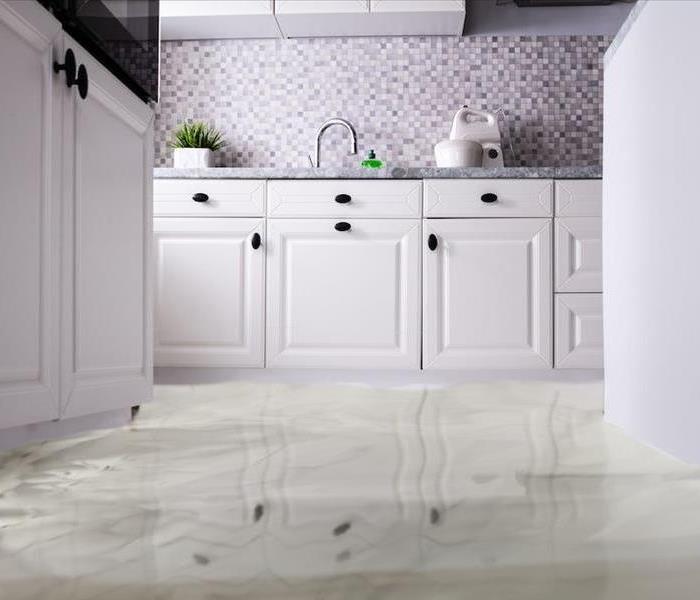 We can help clean up after any water damage.
We can help clean up after any water damage.
Water damage restoration is not all about extracting water from a structure and ventilating the area so that drying can take place. Professionals in this area understand the drying theory and how to apply its principles to achieve the drying goal. So, do not make a mistake of thinking that placing drying equipment and spraying products are all that professionals do during the restoration process. We are going to look at the various aspects that professionals consider when attending to such incidents in Decatur/Forsyth.
The amount of water in your property after a water damage event is also crucial. Our SERVPRO technicians start by determining its source - it can be black water, gray water, or clean water. Clean water does not contain waste products, and it is usually water from a treated source. It can come from faulty appliances, overflowing sinks, leaking roofs and burst pipes. Fewer health risks are associated with this category of water; though, it ceases to be clean once it flows across the soil. In most cases, carpets and pads exposed to clean water are salvageable.
Your pipes could be at risk of freezing this winter.
11/5/2019 (Permalink)
At What Temperature Do Pipes Freeze?
The freezing temperature of water is 32 degrees Fahrenheit. The pipes inside your home, however, are protected from exterior freezing temperatures through your home's insulation. What this means is that it on days where it is 32 degrees outside, it does not necessarily mean that your pipes will freeze.
Typically, your home's pipes begin to freeze when the outside temperature is at least 20 degrees Fahrenheit. Again, this depends on your geographical location. For example, areas that expect lower temperatures have water pipes that are better insulated in inner parts of your home, compared to other areas.
How Long Does It Take For Pipes to Freeze and Burst?
The first thing to think about when answering this question is, what is the exact temperature outside and how long will is it predicted to stay that temperature or lower? As a general rule of thumb, in order for your home's water pipes to freeze, the outside temperature needs to be below 20 degrees, for a total of at least six consecutive hours. How long it will take for your pipes to freeze and burst also depends on your home's insulation, and how deep inside your home your water pipes are located. For example, if you live in a geographical location that usually does not suffer from cold winters, chances are that your water pipes do not have that much insulation to protect them from extreme temperatures. In such cases, the time that it may take for your pipes to freeze and burst may in fact be lower.
How to stop flooding after the snow melts.
11/4/2019 (Permalink)
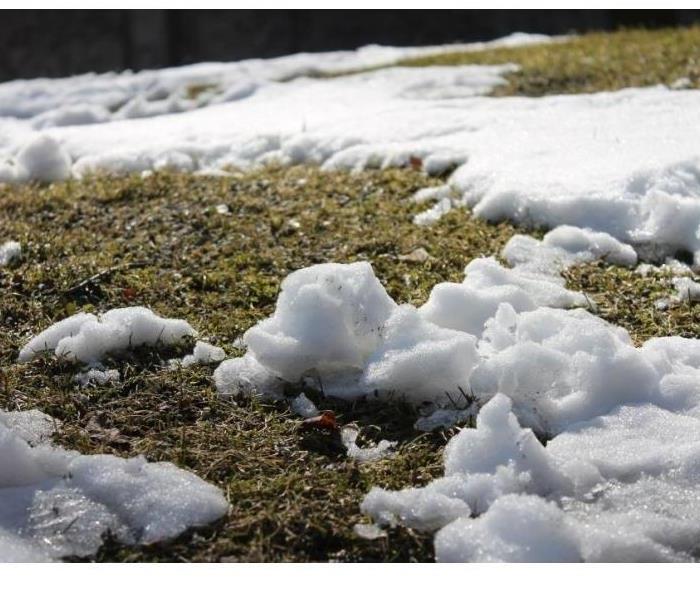 Be prepared for snow melt this season!
Be prepared for snow melt this season!
How to stop your property from flooding when the snow melts
Here in Decatur, we’re all familiar with cold, snow-heavy winters. Over time the buildup of snow can cover our yards and create massive drifts leaning up against the exterior walls of our homes.
While this may help to insulate us from subzero temperatures it can also cause serious flooding as all that snow melts in the early stages of spring. With a little foresight and prevention, you can avoid flooding in your home.
Flooding Damage
Before we get into prevention it’s important to know what the negatives are if flooding does occur:
- water damage to furniture and floors
- warped wood and floorboards
- clogged drains
- mold buildup
- electrical issues
- insurance claims and premium increases
- etc.
The losses you can experience could even go beyond simple costs. Most families store photo albums, heirlooms, and priceless memories in their basements. Flood waters will find those keepsakes and destroy them if you’re not careful.
The time and money needed to clean up after a flood far outweighs the effort needed to stop the problem before it starts.
Tips to Prevent Flooding!
Use these tips to keep help prevent flooding in your Decatur home.
- Shovel snow away from your foundation paying special attention to ground level windows and doors
- Clear drainage areas around your home of snow so water, if it does get in, can get back out
- Check for leaks in the walls, windows, and foundation of your home. Repair any cracks you find to keep the water out
- In warmer months inspect the grade around your house. Make adjustments when necessary to ensure that the ground slopes away from the foundation of your home
- Keep shoveled snow from your driveway and yard on your own property. Street drains need to stay open to do their job properly. The same principle applies to community catch basins
- Check the garden beds around your home and make sure they don’t create dams that retain water, forcing it towards your home. Extra garden soil may be required to fix this problem
BUSTED ICE MAKER LINE? We can help!
10/9/2019 (Permalink)
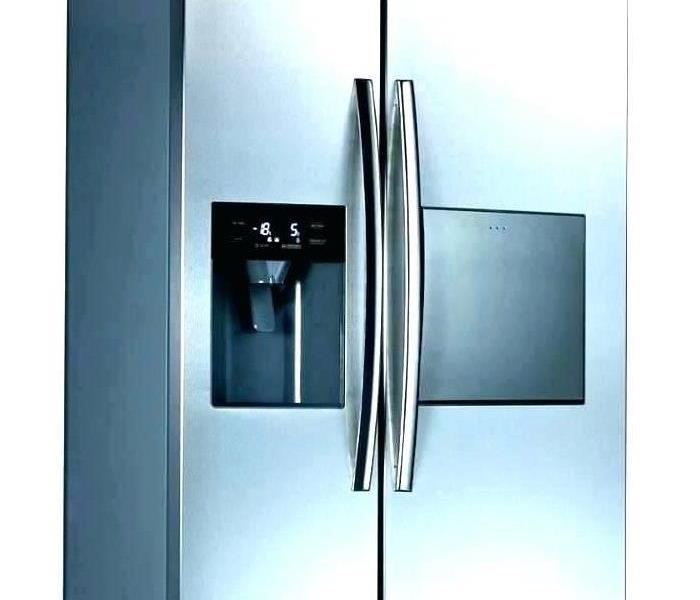 Inspect your refrigerator water line on a regular basis.
Inspect your refrigerator water line on a regular basis.
Home insurance only cover water damages that occur suddenly or accidentally in your home. In the case of a water damage that occurred from a broken water line of the refrigerator, it is considered as a sudden occurrence so the water damage cost and the repair fee for the damaged refrigerator will be covered. For the insurance company, water damage refers to damage caused by water that did not enter into your home from the outside such as the ground. The water damage must be caused by clean water source in order to be eligible for coverage by the home insurance company. Anything that is destroyed as a result of the broken water line will be covered for example damaged flooring.
However, you must keep in mind that there are certain requirements in your policy that you need to follow in order to claim the compensation. For example, if you are going on a holiday trip for a few days, you must turn off the water supply in your house. If you don’t and the water line burst, it will be your own fault and the claim can be denied. Besides, you should also hire someone to check your house daily and make sure everything is all right. This can be used as a proof to your insurance company that everything is in good condition when the water line burst so that your claim can be approved quickly.
The water damage will not be covered if your refrigerator’s water line broke as a result of an unresolved maintenance problem. All appliances will experience wear and tear and your refrigerator can broke down one day. It is your responsibility to hire a professional to inspect your appliances and fix any issue promptly to ensure that they are in good working condition at all times. In this situation, the insurance company will properly pay out the compensation for fixing the flooring that is damaged by the water but it will not cover the cost of the refrigerator.
The water damage coverage requirements vary across different insurance companies so you should check with them yourself. You can first ask your broker whether the claim will be approved before filing it to the insurance company. The compensation that the insurance company releases will not include the deductible amount as well as the spoiled food in the refrigerator. Anything that is not worth filing will not be covered by the insurance.
You can always confirm with your insurance agent about water damage that is covered/not covered by the insurance policy. Home insurance only provides basic coverage for water damage that occurs in the house. If possible, you should purchase additional coverage like a flood insurance to offer more protection for your home from water damage.
SERVPRO of Decatur/Forsyth can help make it "Like it never even happened."
(217) 428-2371
Categories of Water Damage
9/18/2019 (Permalink)
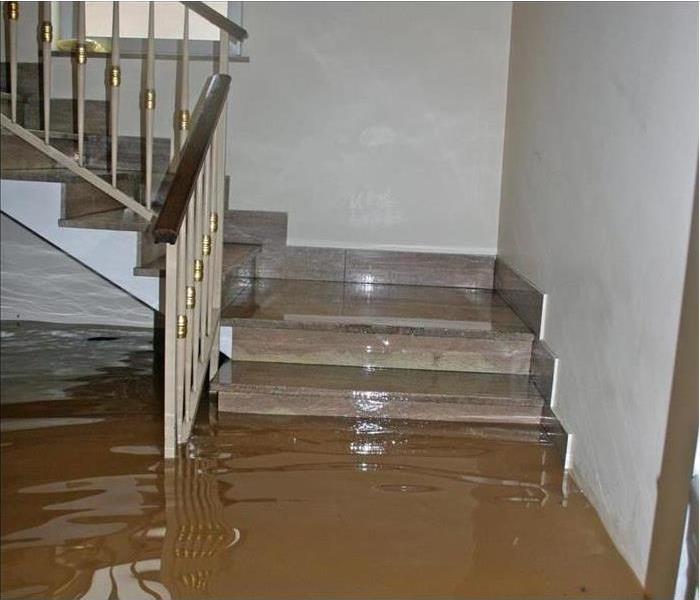 Know the type of water damage you are dealing with.
Know the type of water damage you are dealing with.
You should know the different categories of water damages if you should ever experience one.
Assessing the severity of the damage is important for determining what is needed to start water damage repair and water removal. There are several different categories assigned to water damage. Category 1 refers to clean water, or water that does not pose a threat to humans. Possible causes of this type of damage include broken appliances or sink overflows. Category 2 water is also called gray water. This means that the water is contaminated and may cause sickness of ingested. This type of water contains microorganisms. Broken toilets, broken sump pumps, and seepage may cause category 2 water damage. Category 3 water is known as black water. This type of water is unsanitary, as it contains bacteria and other organisms that cause sickness. The possible sources of black water damage include sewage problems and contamination of standing water.
There are also several classes of water damage. The class of damage is important when assessing water damage repair options. Class 1 is the least harmful form of damage. Materials absorb very little of the water from this type of damage. Water damage repair is the easiest in this type of situation. Class 2 has a fast rate of evaporation, which means that carpets and cushions may be damaged. Water damage repair is more difficult when it involves class 2 damage. Class 3 has the fastest rate of evaporation. In this case, the water may come from broken sprinklers or other overhead sources, soaking the walls and furniture. Class 4 requires special water restoration and water removal procedures. This type of damage may affect hardwood floors, plaster, and concrete.
We do commercial water damages!
9/12/2019 (Permalink)
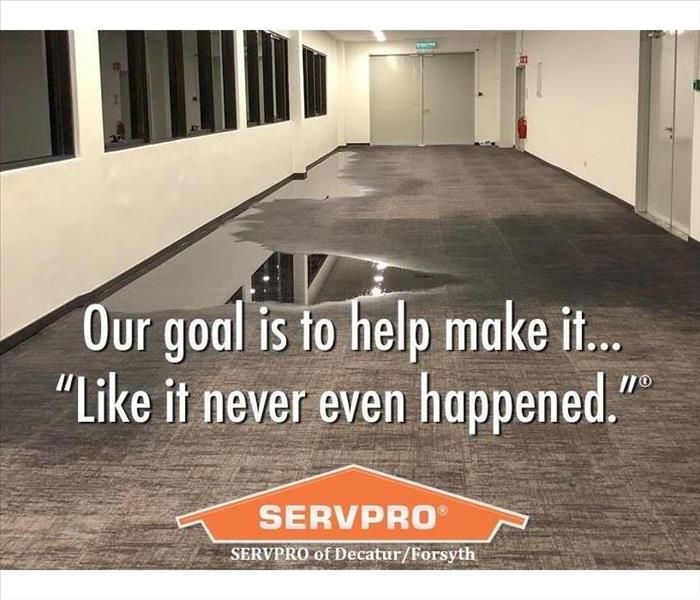 SERVPRO of Decatur/Forsyth can clean up any commercial water damage!
SERVPRO of Decatur/Forsyth can clean up any commercial water damage!
To understand the need for professional water remediation, you need to understand how water can damage your property and why professional help is important. Water spreads fast. Standing water can quickly grow into a mold problem if the water is not extracted and the affected areas dried immediately. Mold can grow in as little as 24 hours if given the right environment. Most water disasters create the perfect environment for mold to grow in. If mold does grow, the damage will become a much bigger, and more costly problem to fix.
When your business suffers from a water disaster, you need help fast! Excessive water damage could put your business out of commission until the damage has been cleaned and restored. To get your business back to business quickly, you need the help of trusted professionals who can remove any standing water, decontaminate any areas affected by contaminated water, and restore any structural damage caused by the water.
SERVPRO of Decatur/Forsyth is available to help 24/7!
Water damage from an upstairs apartment.
9/3/2019 (Permalink)
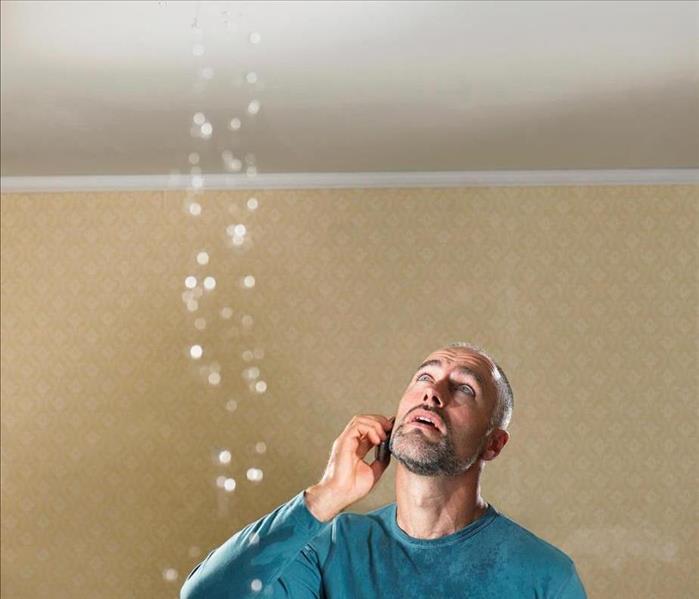 Apartments leaks can happen anywhere anytime.
Apartments leaks can happen anywhere anytime.
Who is responsible for water damage in apartments?
Unfortunately, water damage is a common issue both homeowners and renters can face. The aftermath can be devastating making the property unlivable and permanent damage may occur to personal belongings. When water damage occurs in an apartment, whether you live in cold-weather, or sunny Florida, you need to know who is responsible for the damage cost. The property owner or renter? When water damage occurs in an apartment, who is responsible for the damage cost? The property owner or renter?
Renter rights
Water damage can be unpredictable and it is important to understand your renter rights and understand who is responsible for what in such an event. In general, a landlord is responsible for maintaining the property ensuring that the apartment is livable and functioning up to code. The landlord may refuse repairs, or fail to address them quick in enough – causing further damage such as mold. In the United States, basic principles in tenant rights are in place and outline the party liable for damages. Depending on the state, rent details can vary so check with your local housing authority.
Renters insurance
Accidents happen which is why it is essential to have renters insurance. Most places require you have it before allowing you to move in an apartment. Depending on the plan you select, coverage can vary from damages to the building, personal content and may even cover the cost of lodging while repairs are being completed.
Landlord Responsibilities
The landlord is responsible for maintaining a functional apartment ensure that it is livable. The upkeep of basic plumbing such as sinks, toilets and tubs fall on the shoulders of the landlord. Failure to maintain or repair these functions may lead to property damage and the landlord is liable due to negligence.
We are trained professionals.
8/21/2019 (Permalink)
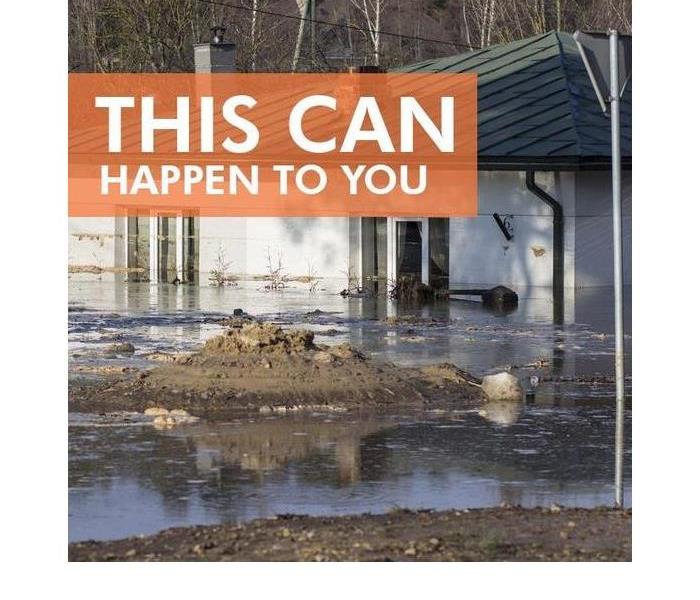 Don't let this happen to you!
Don't let this happen to you!
Everyone on our team at SERVPRO are trained to clean and restore your home or business after it's incurred damage from a storm, water leak or flooding.
We take many steps when cleaning and restoring your home or business after incurred water damage such as:
- Identify the Source/ Type of Water
- Measure Temperature and Humidity for Drying Analysis
- Survey the Extent of Damage and Inspect the Premises for Hidden Moisture
- Perform Emergency Water Extraction
- Move and Block furniture and Contents
- Inspect Carpet Pad/Carpet and Provide Service
- Apply Necessary Treatments (Disinfectants/Deodorization)
- Utilize Advanced Drying and Monitoring Equipment
- Dispose of Refuse
All of our technicians are IICRC certified and have extensive knowledge about our services and equipment. At SERVPRO we make it "Like it never even happened." If you experience water damage call SERVPRO of Decatur/Forsyth (217) 428-2371.
Any type of leak can cause property damage and create safety and health concerns.
8/14/2019 (Permalink)
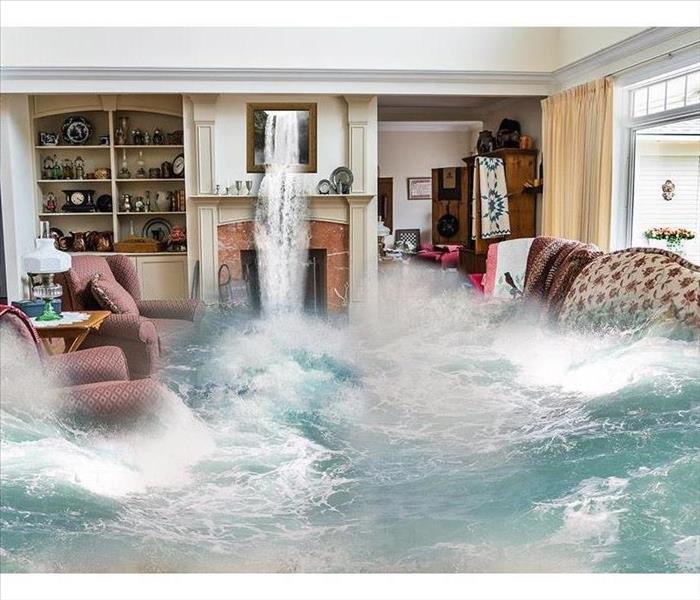 When a disaster strikes we are here to help!
When a disaster strikes we are here to help!
Flooding, plumbing leaks and water damage can happen at any time. Internal and external forces can harm valuable items, carpets, furnishings and structural components. Even in a well-maintained building, pipes can break, toilets can overflow and water can seep behind walls and under floors. Waterlines for refrigerators often create concealed leaks that go unnoticed until mold and mildew have accumulated behind the appliance. The same is true for washing machine hoses that have cracked or become clogged. Water damage can also occur after a violent storm, a flood or several days of steady rain. Basements and lower levels are especially prone to this type of damage.
Water Damage Statistics Any type of leak can cause property damage and create safety and health concerns. It's easy to think that water damage or storm damage won't happen to you, but statistics say otherwise. Water damage is among the most common causes of property insurance claims. One in every 55 homes will have a water-related property damage claim this year. While you cannot stop a storm, you can follow these steps to prevent water damage.
Kitchens and Bathrooms Kitchens and bathrooms are susceptible to water damage due to the amount of plumbing in these areas. Fix leaking or dripping pipes promptly, and be aware of elevated humidity levels that could indicate an underlying plumbing problem. Maintain caulk around showers and bathtubs. Water that passes through gaps can penetrate walls and subfloors. If this sealant has cracked or separated, have it repaired. This is a task that you can probably complete yourself.
Appliances Inspect waterlines for appliances at least once per year. If hoses are brittle, cracked or crimped, replace them before they fail. Turn off the water supply for all appliances before traveling out of town. Pay special attention to hoses for washing machines, refrigerators and ice makers. Since washing machines have inlet hoses and drains, they are especially prone to leaks.
Protecting Pipes Protect plumbing from freezing by insulating pipes that travel along exterior walls or through unheated crawlspaces. On cold nights, open cupboard doors, and let faucets drip. Before winter, drain all watering hoses, and turn off valves for exterior faucets. If a pipe does freeze, don't thaw it too quickly. That's how pipes burst. To protect your plumbing, never set the thermostat below 55 degrees. If an emergency does occur, follow these steps. • Turn off the water supply immediately. Call your utility company if necessary. • Use mops and towels to remove as much water as possible. • Turn on fans, dehumidifiers or air conditioners to remove excess moisture. • Use wood blocks or tinfoil to elevate furniture from wet surfaces. • Remove area rugs, table lamps and colored items to prevent staining and to help dry the underlying surface. • Place wet sofa cushions and upholstered items on end for faster drying. • Never use ceiling lights, TVs or appliances in waterlogged areas. • Remove books, magazines and items that may bleed or stain. • Stay out of areas where ceilings are sagging. By taking preventive measures, you can minimize the likelihood of water damage in Edmond Oklahoma affecting your home. You can also lessen the severity of the water damage by following these tips. If you do experience water damage at your home or business, respond quickly, and call a professional to handle the situation.
Sump Pumps can save your basement from a water damage disaster
8/8/2019 (Permalink)
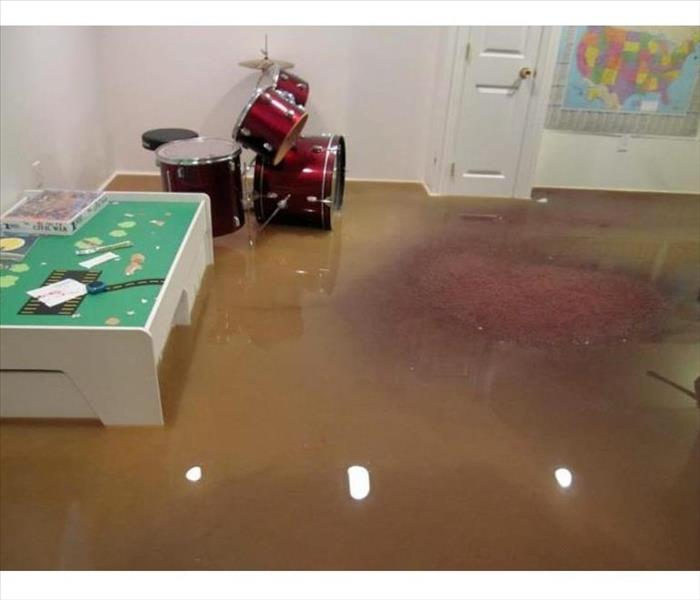 Don't let this happen to you!
Don't let this happen to you!
A sump pump is designed to pump water through a discharge pipe and away from your home's foundation. When a sump pump fails, the result is often a flooded basement and expensive water damage. It doesn't take a lot of water to cause major problems. A small amount of standing water on your basement floor can quickly turn into a nasty mold problem.
You don't have to wait until you have a wet basement to address your sump pump problems. It helps to understand common sump pump problems – and then avoid them by making smart sump pump choices.
1. Overwhelmed pump
If your sump pump isn't the right size, it might not be able to handle high volumes of water, which can leave you with a flooded basement. Sometimes a single pump isn't enough.
2. Pump burn-out
A sump pump can burn out because of a faulty float switch or an overworked, underpowered pump. Cheap pumps made with inexpensive materials and components are prone to failure, especially when they’re needed most during extremely wet weather.
3. Power loss/outage
There are several reasons why a pump might lose power. It could be a tripped circuit breaker, unplugged pump or power outage. No matter what the reason, a normal sump pump doesn't function unless there's power.
4. Clogged intake
When the intake becomes clogged, this prevents the pump from extracting water from the sump pit or sump liner.
5. Frozen/clogged discharge line
The discharge pipe is what carries water from your sump pump to outside the home. The pipe can become clogged with dirt, rocks, roots and other debris. In the wintertime, any water in the discharge line can freeze and clog the system.
Back up sump pumps can save you the heartache of a water damage
6/20/2019 (Permalink)
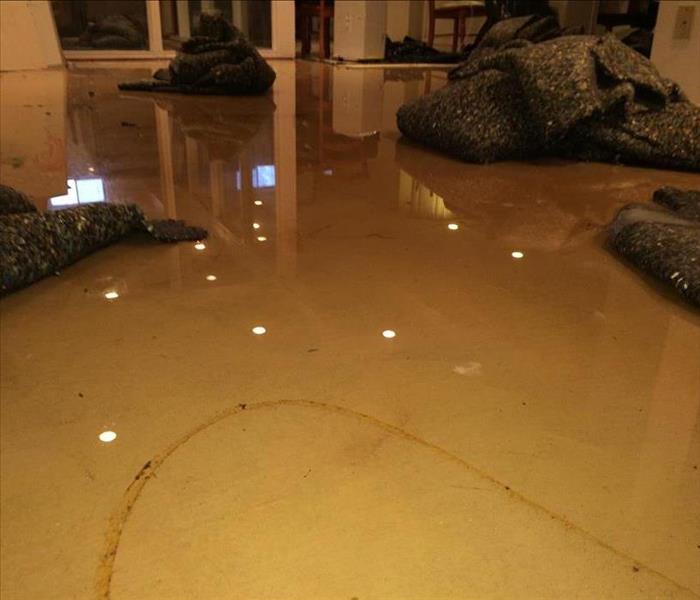 Sump pump back ups are important!
Sump pump back ups are important!
Summer has sprung which means it is time for heavy rains, flooding, and all the not-so-fun basement water damage that often accompanies the rainy season in much of the Midwest. For those homeowners with full basements or larger crawl spaces, you likely have sump pumps. If you don’t, it might be a good idea to have one or two installed.
There are two types of sump pumps: pedestal and submersible. A submersible sump pump rests in a larger basin, with the motor beneath the water line. A pedestal sump pump is smaller, with the motor above the water line. If you have the room, a submersible is the better choice — but if your basement is prone to flooding, any sump pump type is better than no sump pump.
MAINTENANCE
Like your hot water heater and furnace, you should check your sump pump at least once a year to make sure it is in proper working order. For those living in wetter conditions, a twice-yearly check is best. Look at the pump’s power cord to determine if there is any corrosion and the cord is free from contacting water. The test valve should move easily, and any alarms should work.
Flush the drain pipes. Pour hot water into them and see how fast they empty outside. A slow flow likely means the pipes are getting clogged with debris. Check the sump pump for oil leaks. Test the backup battery by unplugging the sump pump and filling the basin with water. The pump should turn on with a battery reserve. Once the basin is empty, plug the pump in and again fill the basin with water to make sure the pump works with electricity.
CLEANING
You might think all this contact with water would keep your sump pump nice and clean — but you’d be wrong. Sump pumps get dirty and can get moldy. If you are handy, you can clean the sump pump unit. Just make sure to unplug it and disconnect the backup battery and any alarms before removing the pump.
You should remove the entire pump for ease of cleaning and to see it better. To do this, remove the fasteners attaching the discharge pipe. If the pump does not come free easily, use a lubricant to loosen it. Place the pump on a tarp or take it outside. Cleaning the pump will get messy.
Once you have the sump pump out, use a dry sponge or clean rag to wipe away grime. For whatever sticks, try a flathead screwdriver or small paint scraper to loosen it. After the debris is cleared away to the best of your ability, it is time to disinfect. This means disinfecting not only the sump pump, but also the basin and the discharge pipe.
Wipe down the outside of the sump pump, the inside of the basin, and the discharge pipes with bleach or vinegar. If you are working indoors, ventilate the area. Wear a face mask and disposable gloves no matter where you are and what you use as a cleaning agent.
For those with a shop vac, put it to use by sucking out all the gunk and water inside the bottom of the pit. Make sure to empty the vac after use and wipe down the inside with disinfectant. Once everything is clean and dry, reassemble the sump pump and plug it in.
HAVE A BACKUP
Lightning often comes with heavy rains and both can knock out electrical power, so it is important to have a sump pump that works with a backup battery. The last thing you want is to know that your basement or crawl space is getting flooded, and the one thing you bought to help with that is not working because the power went out.
BEWARE OF FLASH FLOODS
6/10/2019 (Permalink)
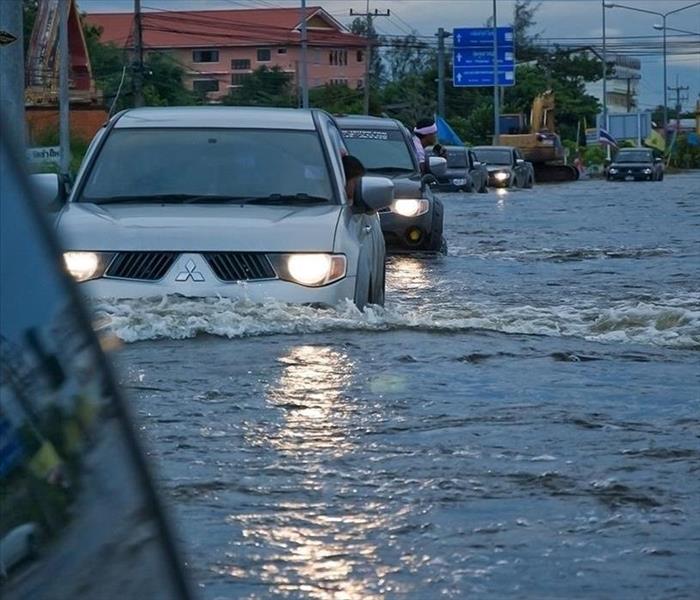 Don't get caught in flash flooding! Be safe.
Don't get caught in flash flooding! Be safe.
11 Facts of flash flooding:
- No region is safe from flooding. All 50 states are subject to flash floods.
- Flash floods can bring walls of water from 10 to 20 feet high.
- A car can be taken away in as little as 2 feet of water.
- To stay safe during a flood, go to the highest ground of floor possible. If your skin comes in contact with flood water, make sure to wash it with soap and disinfected water because the contents are unknown.
- Flooding is caused by spring thawing (snow and frozen grounds melting in the spring), heavy rains, snow melt runoffs, flash floods, and mudflows.
- Floods are the most widespread natural disaster aside from wildfires. 90% of all U.S. natural disasters declared by the President involve some sort of flooding.
- In preparation for a flood, it is important to stock up on first aid items, non-perishable foods, 3 gallons of water per person for 3 days, battery operated radio for weather reports, extra batteries, personal hygiene necessities.
- Based on Floodsmart, a 2,000 square foot home undergoing 12” of water damage could cost more than $50,000.
- Since flood damage is almost never covered by homeowners insurance, flood insurance is important for people living in high-risk flood zones.
- To stay safe during a flood, go to the highest ground of floor possible. If your skin comes in contact with flood water, make sure to wash it with soap and disinfected water because the contents are unknown.
- Communities particularly at risk are those located in low-lying areas, near water, or downstream from a dam.
SERVPRO of Decatur/Forsyth wants you to be aware and prepared for any natural disaster! We are always here to help!
(217)428-2371
A bad roof can lead to extreme damage to your home.
6/6/2019 (Permalink)
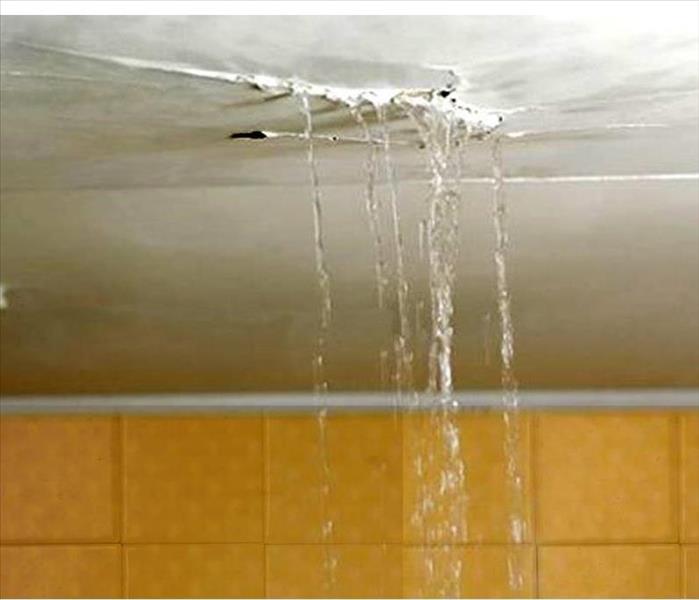 A water damage could cost you thousands of dollars.
A water damage could cost you thousands of dollars.
How to tell if your roof is leaking....
Here are a 17 things to look for »
- Water stains or damp spots on your ceiling
- Moist drywall or paint around light fixtures or electrical outlets
- Damp spots around interior air vents or fireplaces
- Interior paint bubbling or peeling during hard rains
- Dripping sounds inside your home
- Water stains on rafters or on roof sheathing inside your attic
- A musty house smell (especially in your attic)
- Curling or buckling shingles on your roof
- Loose shingles laying in your yard
- Loose or exposed nails on your roof
- Cracked or damaged flashing around roof vents
- Loose flashing or cracked sealants around your chimney
- Roof rot with discolored or excessively degraded shingles
- Peeling paint or rotten areas under roof eaves
- Clogged or loose gutters & downspouts
- Debris piles in roof valleys or above chimney
- Shingle granules in your gutters
Regular maintence to your roof can save you the heartache from a water damage.
Water can be fun this summer but make sure you use water safety.
5/23/2019 (Permalink)
 Stay safe this summer!
Stay safe this summer!
Water Safety Tips! Pool Safety
1. Staying close, being alert and watching children in and around the pool
- Never leave a child unattended in a pool or spa and always watch your child when he or she is in or near water
- Teach children basic water safety tips
- Keep children away from pool drains, pipes and other openings to avoid entrapment's
- Have a telephone close by when you or your family is using a pool or spa
- If a child is missing, look for him or her in the pool or spa first
- Share safety instructions with family, friends and neighbors
2. Learning and practicing water safety skills
- Learn how to swim and teach your child how to swim
- Learn to perform CPR on children and adults, and update those skills regularly
- Understand the basics of life-saving so that you can assist in a pool emergency
3. Having appropriate equipment for your pool or spa
- Install a four-foot or taller fence around the pool and spa and use self-closing and self-latching gates; ask your neighbors to do the same at their pools.
- Install and use a lockable safety cover on your spa.
- If your house serves as a fourth side of a fence around a pool, install door alarms and always use them. For additional protection, install window guards on windows facing pools or spas.
- Install pool and gate alarms to alert you when children go near the water
- Ensure any pool and spa you use has compliant drain covers, and ask your pool service provider if you do not know
- Maintain pool and spa covers in good working order
- Consider using a surface wave or underwater alarm
Leave leaky pipes to the professionals
5/7/2019 (Permalink)
 Leaky pipes need to be fixed immediately before it cost you thousands in water damage repairs!
Leaky pipes need to be fixed immediately before it cost you thousands in water damage repairs!
Whether your regular inspection reveals a puddle under a pipe or you get an unpleasant surprise when you reach under your sink, leaks can be a costly nuisance. Leaks usually happen at joints, which is why commercial joint fillers and fitting compounds occupy plenty of shelf space in your local hardware store. These products are a temporary fix, though; a permanent plumbing repair may mean replacing a length of pipe or its fittings.
Although replacing a leaky U-joint under your sink isn’t a complex repair, it is a messy one. You may want to have a professional handle it for you to save the clean-up time. Until the plumber can get to your leak, use a compression clamp and a rubber sheet or leak tape. These temporary repairs keep water from spraying but are easily removed when it’s time for a permanent solution.
Did you know there are different types of water!
5/3/2019 (Permalink)
 We can make water disappear!
We can make water disappear!
Know the Different Types of Water
Believe it or not, there are three types of water. The first type is “clean” water from rain, condensation, leaky pipes, and so on. It’s relatively harmless to clean it up yourself. But if you decide to seek outside help, it costs for basic water damage cleanup (replacements not included). The second type is gray water, slightly dirty water from dishwashers, washing machines, clean toilets, and so on. And it may have some contaminants. But you can clean it up yourself if you remove it carefully and with proper safety gear to protect yourself. Professional water damage cleanup cost rises.The third type is black water, such as sewage or serious flooding from nearby rivers, etc. This water contains waste, bacteria and other serious contaminants. Black water can cause very serious health problems, and you shouldn’t try to clean it up yourself. It’s time to contact the pros for home water damage repair. Water damage cleanup cost rises.
Helpful tips to know when you have a WATER DAMAGE!
5/1/2019 (Permalink)
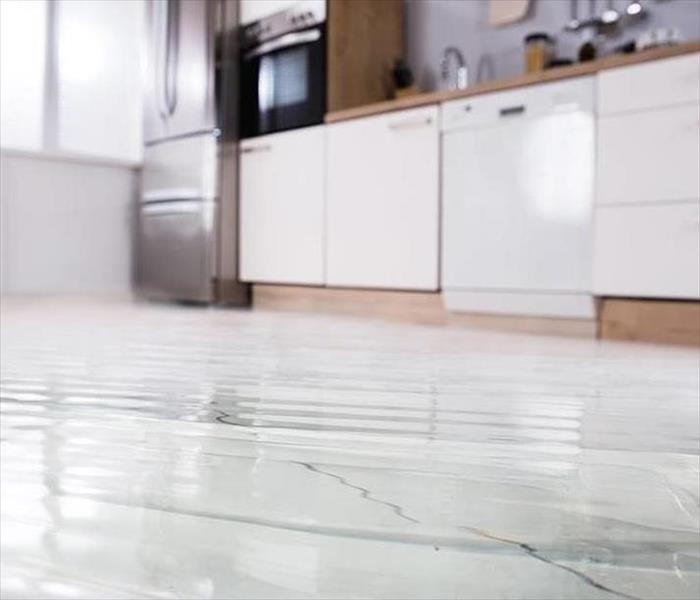 Don't wait act fast! Give SERVPRO of Decatur/Forsyth a call!
Don't wait act fast! Give SERVPRO of Decatur/Forsyth a call!
Water Damage Timeline
Within Minutes
- Water quickly spreads throughout your property, saturating everything in its path.
- Water is absorbed into walls, floors, upholstery, and belongings.
- Furniture finishes may bleed, causing permanent staining on carpets.
- Photographs, books, and other paper goods start to swell and warp.
Hours 1 - 24:
- Drywall begins to swell and break down.
- Metal surfaces begin to tarnish.
- Furniture begins to swell and crack.
- Dyes and inks from cloth and paper goods spread and stain.
- A musty odor appears.
48 Hours to 1 Week:
- Mold and mildew may grow and spread.
- Doors, windows, and studs swell and warp.
- Metal begins to rust and corrode.
- Furniture warps and shows signs of mold.
- Paint begins to blister.
- Wood flooring swells and warps.
- Serious biohazard contamination is possible.
More Than 1 Week:
- Restoration time and cost increase dramatically; replacing contaminated materials and structural rebuilding may be extensive.
- Structural safety, mold growth, and bio-hazard contaminants pose serious risks to occupants.
SERVPRO of Decatur/Forsyth always here to make it "Like it never even happened."
Flood damage at your property?
3/21/2019 (Permalink)
What to do if you have a flood damage at your property
A flood can be one of the most devastating things to happen to your home and life. It can come from heavy rain, a broken pipe, defective appliances, sewage backup, and other unexpected causes. Because flooding is generally kept off your radar until it actually happens, you may find yourself overwhelmed with questions about how to act in the best interest of your safety and belongings. Here are three tips for responding to a home flood.
1. Identify the Damage
Is the source of the water a broken pipe or something more complicated? Is it clean water or contaminated? These kind of questions will help you decide how to proceed. If it's Category 2 or Category 3 contaminated water, it could be hazardous to enter the area without proper protective gear. Do not enter the wet area unless it is clear what kind of damage you have experienced.
2. Turn Off Power
Your next move should be to shut off the main power to your home in order to avoid electrocution in the initial cleanup stages. If this task will have you wading through the flooded area, do not proceed with the list and simply evacuate the home.
3. Call a Professional
Although there are minor things you can do while waiting for emergency restoration services to arrive, it is not wise to take on remediation without the proper training and experience. There are a mountain of risks that could end up worsening the damage if you’re not careful. Even simply waiting too long to begin cleanup poses a danger to your home and health, so it is best to act as soon as the water in your home is detected. Do not attempt to fix a damaged pipe or appliance on your own, either; always consult an expert.
If you experience a flood due to a broken pipe or other water event, it's important to act quickly and safely. Sometimes the safest, smartest thing to do is leave cleanup to the professionals.
Call SERVPRO of Decatur/Forsyth
(217) 428-2371
Here are some common causes of water damage and how you can spot the warning signs.
3/21/2019 (Permalink)
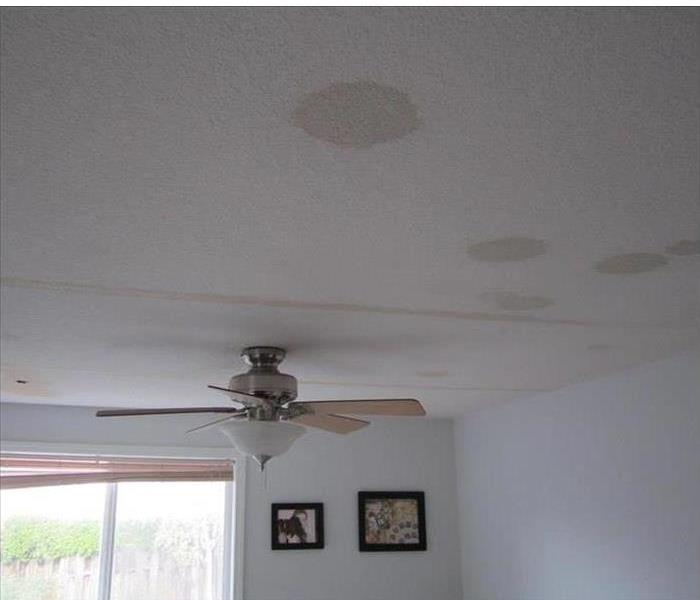 Water damage on a ceiling
Water damage on a ceiling
Flooding is very common in the spring season. While the damage from a flood is pretty apparent, there are many ways water damage can happen to your home when you don’t even realize it.
Here are some common causes of water damage and how you can spot the warning signs.
Weather is a common cause of water damage. Rains (snow and ice during the winter) cause flooding that can get into your home. Ice is an especially insidious cause of water damage because it expands as it freezes, causing cracks that allow more water to enter your home.
Even if it isn’t raining or snowing there is still moisture in the air. Damp air can lead to condensation and water damage to your walls. This is especially true of basements, bathrooms, and other damp areas of your home that don’t get much airflow.
Appliances like your washing machine, garbage disposal, water heater, toilet, and air conditioner can all contribute to water damage if they leak or stop draining properly.
Water from our pipes and plumbing systems can also cause water damage. Leaks and drips can go on for months, or even years, raising your water bill and doing unseen damage to your home.
So if these are all the ways water can sneak into your home, what are the signs of water damage?
Here are a few warning signs that you have a water damage problem in your home.
Standing water – This may sound pretty obvious, but if you notice water pooling in your house you have a water problem that needs to be taken care of immediately.
Bad smells – While water doesn’t normally have much of a smell, the mold and bacteria that grow in damp environments can give off a distinct musty, wet odor. If you smell mold or mildew you might have a water issue.
Stains and spots – Stains on the ceilings or walls can be a sign of water damage. You might have a leaky pipe or roof. Call a professional to determine the cause of the problem and to clean up the damage before it becomes a serious mold problem.
Peeling paint – Paint damaged by water will start to peel, bubble, or flake off.
Uneven surfaces – Water damage can cause floors, ceilings, walls, and other surfaces to warp and feel uneven.
Cracks – Water is always seeking the path of least resistance out of your home. Water can enter through cracks and once water finds it’s way in, the crack will expand allowing even more to get into your home. Make sure you seal all visible cracks on your property.
If you notice your home has water damage call the experts at SERVPRO of Decatur/Forsyth
(217) 428-2371
Here's what to do if your pipes freeze
3/20/2019 (Permalink)
1. Shut off your water and, if necessary, electricity
Go to the home’s main water valve and shut it off immediately. (And don’t wait for a burst pipe to find out where the main water valve is located.) Electricity should also be cut off to the section of the home where the water damage has occurred, Thompson said. If you live in an apartment complex and don’t have control over the building’s water supply, he added, be sure to contact your building manager or landlord.
2. Call a plumber.
Not all plumbing companies have 24-hour service, so it’s a good idea to research and choose one in advance so you’re not scrambling after water floods your house. Plumbing costs vary depending on where the pipes are located and how bad the damage is, Thompson said. You may also need to contact a water damage professional, he said, particularly if carpeting, flooring, walls or ceilings are severely damaged.
3. Call SERVPRO of Decatur/Forsyth
(217)428-2371
Important Files In Water Damage
9/10/2018 (Permalink)
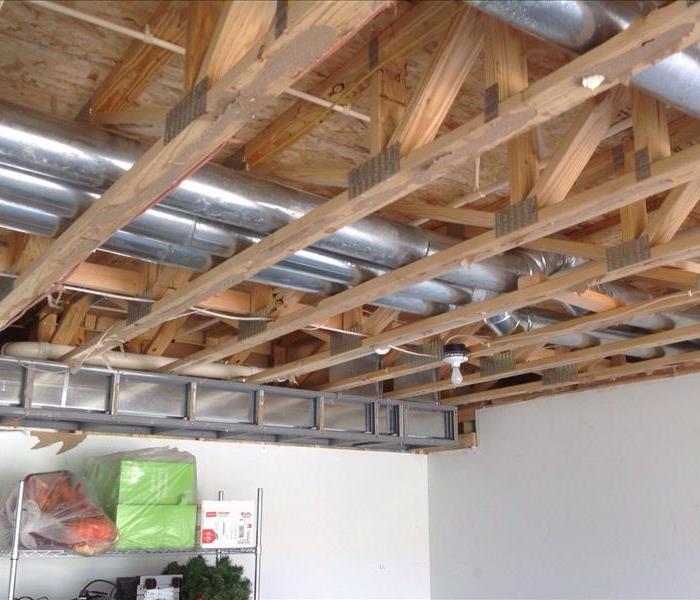 Garage flooded
Garage flooded
SERVPRO of Decatur/Forsyth received an emergency call about a flooded top floor that was seeping through the floor into a garage full of files. It was very serious out of the calls we have received. We handle all jobs importantly. Almost everything was affected: drywall, concrete,tile, files, and expensive equipment. A nightmare you can imagine if you are a homeowner such as this one. We quickly shifted into gear working to save and restore as much as we possibly could. The customers spoke clearly with what they wanted us to do and our crew did what was wanted and needed. The items and files that were soaked were taken back to the warehouse stored and dried. One satisfied client story after another is SERVPRO of Decatur/Forsyth’s never ending goal!
Important Files In Water Damage
9/10/2018 (Permalink)
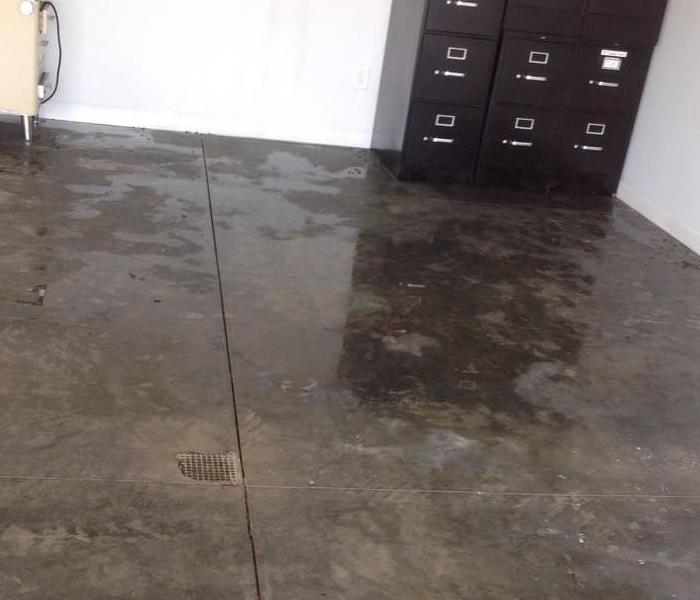 Garage flooded
Garage flooded
SERVPRO of Decatur/Forsyth received an emergency call about a flooded top floor that was seeping through the floor into a garage full of files. It was very serious out of the calls we have received. We handle all jobs importantly. Almost everything was affected: drywall, concrete,tile, files, and expensive equipment. A nightmare you can imagine if you are a homeowner such as this one. We quickly shifted into gear working to save and restore as much as we possibly could. The customers spoke clearly with what they wanted us to do and our crew did what was wanted and needed. The items and files that were soaked were taken back to the warehouse stored and dried. One satisfied client story after another is SERVPRO of Decatur/Forsyth’s never ending goal!
How good is our SERVPRO Team?
3/27/2018 (Permalink)
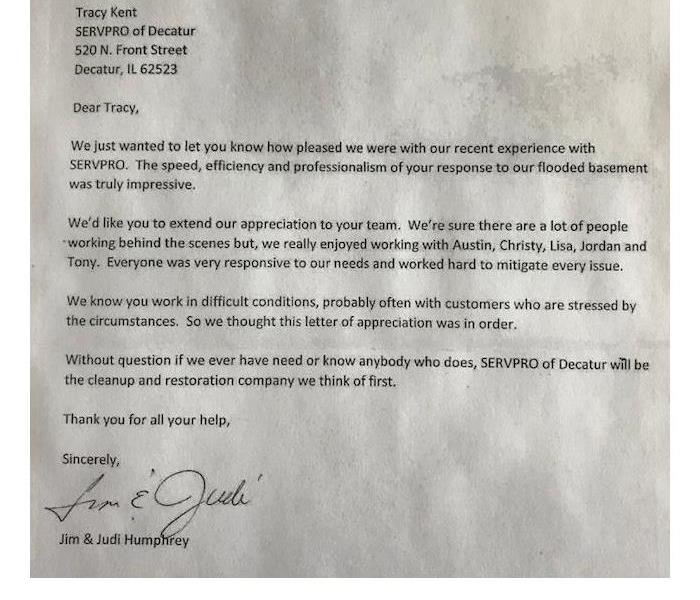 What an awesome testament to how great our SERVPRO team truly is!
What an awesome testament to how great our SERVPRO team truly is!
SERVPRO of Decatur/Forsyth received an emergency call about a flooded basement. It was similar to calls we have received before yet had some unique facets to it as well. As SERVPRO arrived at the homeowners location we discovered a beautifully well done finished basement that was saturated by water from the steps down. Almost everything was affected: drywall, concrete, carpeting, tile, laminate flooring, antique furniture, and a custom made pool table and gorgeous bar. A nightmare you can imagine if you are a homeowner such as this one. We quickly shifted into gear working to save and restore as much as we possibly could. Per Jim and Judi Humphrey in a thank you letter they stated “The speed, efficiency and professionalism of your response to our flooded basement was truly impressive.” “Everyone was very responsive to our needs and worked hard to mitigate every issue.” One satisfied client story after another is SERVPRO of Decatur/Forsyth’s never ending goal!
Facts to know!
6/8/2017 (Permalink)
 SERVPRO of Decatur/Forsyth
SERVPRO of Decatur/Forsyth
Need Emergency Service? Call Us 24/7 – 217-428-2371
Water Damage Timeline
Within Minutes
- Water quickly spreads throughout your property, saturating everything in its path.
- Water is absorbed into walls, floors, upholstery, and belongings.
- Furniture finishes may bleed, causing permanent staining on carpets.
- Photographs, books, and other paper goods start to swell and warp.
Hours 1 - 24:
- Drywall begins to swell and break down.
- Metal surfaces begin to tarnish.
- Furniture begins to swell and crack.
- Dyes and inks from cloth and paper goods spread and stain.
- A musty odor appears.
48 Hours to 1 Week:
- Mold and mildew may grow and spread.
- Doors, windows, and studs swell and warp.
- Metal begins to rust and corrode.
- Furniture warps and shows signs of mold.
- Paint begins to blister.
- Wood flooring swells and warps.
- Serious biohazard contamination is possible.
More Than 1 Week:
- Restoration time and cost increase dramatically; replacing contaminated materials and structural rebuilding may be extensive.
- Structural safety, mold growth, and biohazard contaminants pose serious risks to occupants.
About SERVPRO of Decatur/Forsyth
SERVPRO of Decatur/Forsyth specializes in the cleanup and restoration of residential and commercial property after a fire, smoke or water damage event. Our staff is highly trained in property damage restoration. From initial and ongoing training at SERVPRO’s corporate training facility to regular IICRC-industry certification, rest assured our staff is equipped with the knowledge to restore your property.
Basement floods in Decatur, IL
5/23/2017 (Permalink)
 Estate items in a flooded basement
Estate items in a flooded basement
On Monday, May 1st, Mary and George woke up to find several inches of water in their basement due to sump pump failure. By 8:30am, SERVPRO of Decatur/Forsyth was on site. The basement was home to George's train, as well as many sentimental items.
The office sent four staff members to quickly transfer contents to the homeowners garage, "they were organized, careful, and considerate of our belongings."
The flooded basement contained sentimental estate items of Mary's late mother. Mary and George were very concerned that the items that were moved were handled with care.
"Everyone at SERVPRO of Decatur/Forsyth was professional, friendly, and courteous. Thank you so much for your hard work. I have been recommending SERVPRO of Decatur/Forsyth to everyone who may need your help."
Early Morning Broken Pipe
3/17/2017 (Permalink)
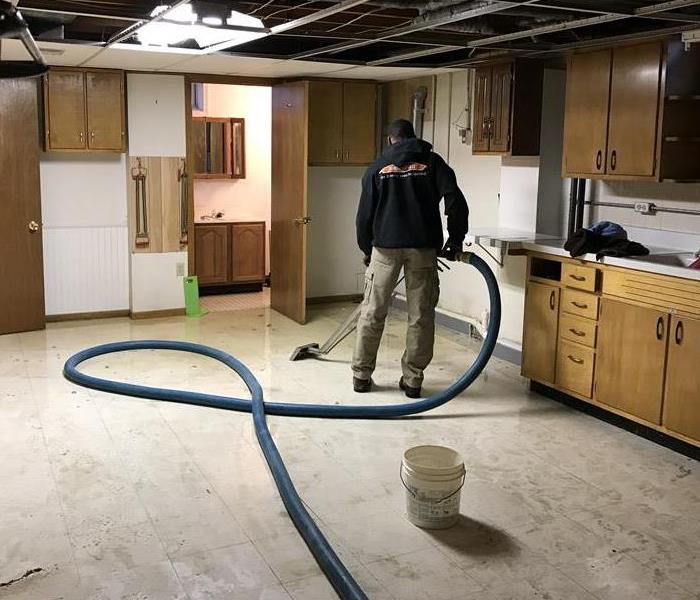 SERVPRO of Decatur employee working on clean up.
SERVPRO of Decatur employee working on clean up.
At 3:30am on March 3rd, Katie Hill woke up in a panic. After hearing running water, she rushed downstairs to find a broken pipe in her basement ceiling, with water pouring everywhere. Water was soaking the ceiling tiles, the cabinets, and the floor.
She called SERVPRO of Decatur/Forsth's after hours answering service. A manager from SERVPRO called her back ten minutes later and they were on site within an hour. Katie Hill said, "I never knew you were on call 24 hours a day, but I'm sure glad I called when I did!"
Within in about 90 minutes SERVPRO of Decatur/Forsyth staff were making great headway on the extraction and clean up. Within four days, SERVPRO of Decatur/Forsyth had Katie's structure and contents dried out.






 24/7 Emergency Service
24/7 Emergency Service










